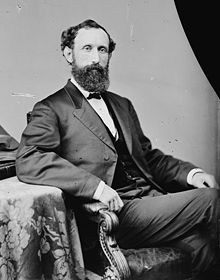William Pitt Kellogg

William Pitt Kellogg (December 8 1830 - August 10 1918) was an American politician and a carpetbagger governor of Louisiana from 1873-1877. He was the state's last Republican governor until the inauguration of David C. Treen in 1980.
Kellogg was born in Orwell in Addison County in western Vermont near the New York boundary, where he spent his childhood. He moved to Peoria, Illinois, at the age of eighteen and taught school for several years. He then became a lawyer and moved to Canton, also in Illinois, where he practiced law. There he joined the Republican Party and eventually came to know Abraham Lincoln, a fellow Illinois lawyer. When Lincoln became President in 1861, he appointed Kellogg to be the chief justice of the Supreme Court of the Nebraska Territory. Kellogg accepted this position but soon resigned and joined the seventh Illinois cavalry. By 1862, he had risen to the rank of colonel and played an important role at a small battle near Sikeston, Missouri. Later in the war, Kellogg resigned because of ill health.
In 1865, at the end of the civil war, Lincoln, days before his assassination, appointed Kellogg to be the collector of the port of New Orleans. This launched a notable 20-year political career in Louisiana. He remained collector of New Orleans until 1868, when he was appointed to the United States Senate, when "reconstructed" Louisiana returned to the federal Union. Kellogg resigned from the Senate in 1872, when he was elected governor. In the election of 1872 John McEnery, a Democrat, faced Republican William Pitt Kellogg. Sitting Governor Henry Clay Warmoth, a Republican, supported McEnery because Warmoth opposed the Republican Party faction loyal to President U. S. Grant, who supported Kellogg. As Governor, Warmoth controlled the State Returning Board, the institution which administered elections. His board named McEnery the winner but a rival board claimed Kellogg the victorious. Warmoth was impeached for allegedly stealing the election. A black Republican, P. B. S. Pinchback became Governor for 35 days until Grant seated Kellogg with Federal protection as Governor. McEnery's faction established a "rump legislature" in New Orleans to oppose Kellogg's actions. McEnery urged his supporters to take up arms against Kellogg's fraudulent government. Action by the anti-Republican White League caused President Grant to send Federal reinforcements to New Orleans. Until Federal troops were removed from Louisiana in 1877, no Democrat could be elected[1].
Kellogg's lieutenant governor was the African American Caesar Carpetier Antoine, a native of New Orleans, who had been a state senator from Shreveport at the time. Despite the intense backlash against the Republican Party in the South, Kellogg was able to return to the United States Senate in 1876. He served in the Senate until 1883. He did not seek reelection, for his party was too weak in the South to be competitive. He was the chairman of the Senate Committee on Railroads from 1881 to 1883.
Kellogg was elected to the United States House of Representatives in 1882 and served one term from 1883 to 1885. He continued to live in Washington, D.C., but retired from political life. He died in Washington and is buried at Arlington National Cemetery in Virginia.
Kellogg was one of the most important politicians in Louisiana during and immediately after Reconstruction. He was able to maintain power for much longer than most other carpetbagger Republicans who moved to the southern states after the Civil War. He is also notable as one of few senators to be elected to the House of Representatives immediately after leaving the Senate. The late Claude Pepper, a Florida Democrat was similarly elected to the House after serving in the Senate, but twelve years passed between the end of his Senate service and the beginning of his long House tenure.
References
- ^ http://www.sos.louisiana.gov/tabid/382/Default.aspx State of Louisiana - Biography
External links
- Annual Message of His Excellency Governor Wm. Pitt Kellogg, to the General Assembly — Google Books full online browsing copy
- State of Louisiana - Biography
- Cemetery Memorial by La-Cemeteries
- United States Senators from Louisiana
- Governors of Louisiana
- 1830 births
- 1918 deaths
- People of Vermont in the American Civil War
- Louisiana Republicans
- Members of the United States House of Representatives from Louisiana
- People from Peoria, Illinois
- People from Fulton County, Illinois
- People from Louisiana
- American lawyers


